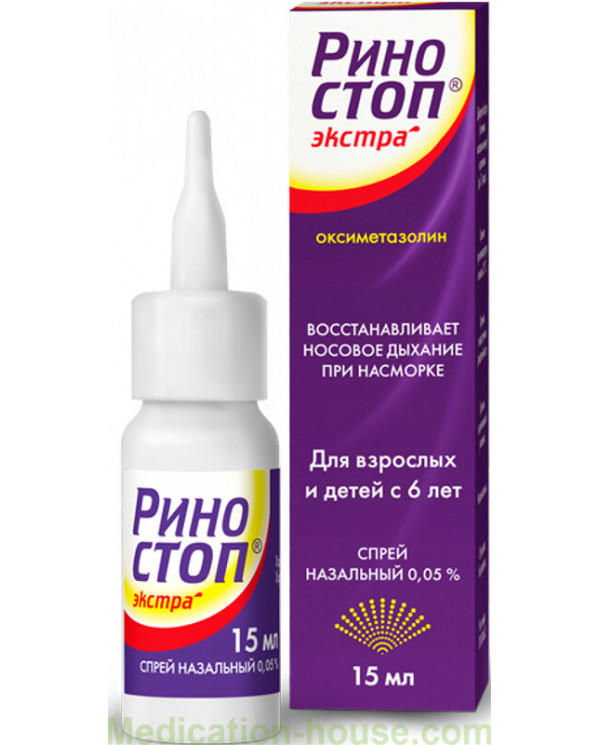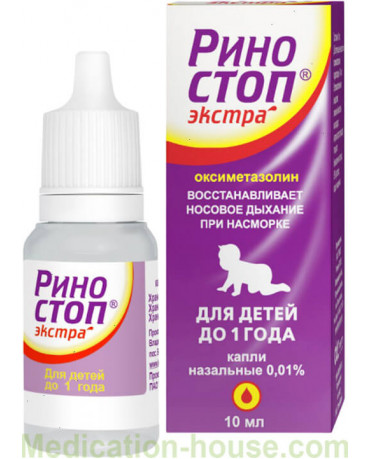Instruction for Rinostop Extra spray
You can buy Rinostop Extra spray here
Structure
1 ml:
active substance: Oxymetazoline hydrochloride - 0.5 mg.
excipients: Citric acid monohydrate - 0.609 mg; sodium citrate dihydrate - 3.823 mg; glycerol - 24.348 mg; benzalkonium chloride - 0.15 mg; purified water - up to 1 ml.
Pharmacodynamics
Oxymethazoline belongs to the group of alpha-adrenostimulants for topical use. It has a vasoconstrictor effect. With intranasal administration, it reduces swelling of the mucous membrane of the upper respiratory tract and discharge from the nose. Restores nasal breathing.
Elimination of edema of the mucous membrane of the nasal cavity helps to restore aeration of the paranasal sinuses of the nasal cavity, middle ear cavity, which reduces the likelihood of bacterial complications (sinusitis, sinusitis, otitis media). With local intranasal use at therapeutic concentrations, it does not irritate and does not cause hyperemia of the nasal mucosa.
Oxymetazoline begins to act with 25 seconds. The duration of Rinostop Extra spray is up to 12 hours.
Pharmacokinetics
With topical intranasal use, oxymetazoline does not have a systemic effect. The half-life of oxymetazoline when administered intranasally is 35 hours. 2.1% of oxymetazoline is excreted by the kidneys and about 1.1% through the intestines.
Indications for use
treatment of acute respiratory infections accompanied by a runny nose;
allergic rhinitis;
vasomotor rhinitis;
to restore drainage with inflammation of the sinuses, eustachitis, otitis media;
to eliminate edema before diagnostic procedures in the nasal passages.
Contraindications
hypersensitivity to the components of Rinostop Extra spray;
atrophic (dry) rhinitis;
angle-closure glaucoma;
condition after transsphenoid hypophysectomy;
surgical interventions on the dura mater (in history);
children under 6 years old.
Carefully
With increased intraocular pressure, chronic heart failure, arterial hypertension, angina pectoris; arrhythmias; chronic renal failure; in patients with prostatic hyperplasia with clinical symptoms (urinary retention); severe atherosclerosis; with hyperthyroidism; diabetes mellitus; pheochromocytoma; tachycardia; therapy with monoamine oxidase inhibitors (MAOs) (including up to 14 days after their withdrawal) and tricyclic antidepressants, as well as other drugs that increase blood pressure; porphyria; pregnancy, during breastfeeding.
Use during pregnancy and during breastfeeding
When used during pregnancy or breastfeeding, the recommended dose should not be exceeded. Rinostop Extra spray can be used only in cases where the potential benefit to the mother outweighs the potential risk to the fetus or child.
Dosage and administration
Intranasally.
Adults and children over 6 years: 1 injection into each nostril 2-3 times a day.
If symptoms worsen or improvement does not occur within 3 days, consult a doctor. In the recommended dose, without consulting a doctor, use no more than 7 days.
With frequent and prolonged use of Rinostop Extra spray, a feeling of nasal congestion may reappear or worsen. If these symptoms appear, discontinue treatment and consult a doctor.
Side effect of Rinostop Extra spray
Infrequently: burning or dryness of the mucous membranes of the nasal cavity, sneezing, nosebleeds.
In rare cases: after the effect of the use of Rinostop Extra spray passes, a feeling of nasal congestion (reactive hyperemia).
Frequency unknown: dry mucous membranes of the mouth and throat, increased secretion from the nose.
Side effects due to the systemic effect of Rinostop Extra spray:
Infrequently: Quincke's edema, itching.
Rarely: increased blood pressure, headache, dizziness, palpitations, tachycardia, anxiety, irritability, sleep disturbance (in children), nausea, insomnia, exanthema, impaired vision (in the eyes).
Very rarely: anxiety, fatigue, drowsiness, sedation, hallucinations, cramps, respiratory arrest (in infants).
Prolonged continuous use of vasoconstrictor drugs can lead to tachyphylaxis, atrophy of the mucous membrane of the nasal cavity and recurrent swelling of the mucous membrane of the nasal cavity (drug rhinitis).
If any of the side effects indicated in the instructions are aggravated, or if you notice any other side effects not listed in the instructions, inform your doctor.
Overdose
The clinical signs of intoxication with imidazole derivatives can be nonspecific and fuzzy, since the phases of hyperactivity are replaced by phases of inhibition of the central nervous system, cardiovascular and respiratory systems.
Symptoms: anxiety, anxiety, hallucinations, convulsions, lowering body temperature, lethargy, drowsiness, coma, constricted or dilated pupils, fever, sweating, pallor, cyanosis, palpitations, bradycardia, arrhythmia, cardiac arrest, increased blood pressure, decreased blood pressure , nausea, vomiting, respiratory depression, respiratory arrest.
In children, an overdose can be the cause of the development of symptoms from the central nervous system, such as: agitation, convulsions, coma, bradycardia. respiratory arrest, as well as an increase in blood pressure, followed by a possible decrease in blood pressure.
Treatment: gastric lavage, taking activated charcoal (in case of accidental ingestion of Rinostop Extra spray inside); symptomatic.
In severe overdose, intensive care is indicated in a hospital setting. The use of vasoconstrictors is contraindicated.
Interaction with other drugs
With the simultaneous use of monoamine oxidase inhibitors (during the previous 2 weeks and within 2 weeks after their withdrawal), tricyclic antidepressants or other drugs that increase blood pressure, an increase in blood pressure can be observed.
Rinostop Extra spray slows down the absorption of local anesthetics, lengthens their effect.
Co-administration of other vasoconstrictor drugs increases the risk of side effects.
special instructions
Avoid contact with eyes.
Avoid prolonged use and overdose of Rinostop Extra spray, especially in children.
In order to avoid the spread of infection, it is necessary to use Rinostop Extra spray individually.
Impact on the ability to drive vehicles and mechanisms
After prolonged use of colds containing oxymetazoline in doses exceeding the recommended ones, the general effect on the cardiovascular system and central nervous system cannot be ruled out. In these cases, care should be taken when driving vehicles and engaging in other potentially hazardous activities that require increased concentration of attention and speed of psychomotor reactions.
Release form
Nasal Spray 0.05%.
15 ml per bottle of polymer from high density polyethylene. Bottles are rolled with a pump and supplied with an actuator complete with a protective cap.
A self-adhesive label is glued onto the bottle.
Each bottle, together with the actuator, complete with a protective cap and instructions for use, is placed in a pack of cardboard.
Storage conditions
Store at a temperature not exceeding 25 ° C.
Keep out of the reach of children.
Shelf life - 2 years. Do not use after the expiration date indicated on the package.
Terms of sell
You dont need a prescription to buy Rinostop Extra spray.


